According to Algirdas Kazlauskas, Chief Analyst at Debunk EU, despite the fact that the lock down is getting less restricted in countries, the topic of COVID-19 is still inexhaustible for the sources of disinformation – new contexts are being discovered for its development. Whereas last month Russia commemorated the Soviet Union's victory over Germany in World War II, the event was not missed and was used for the topic of pandemic.
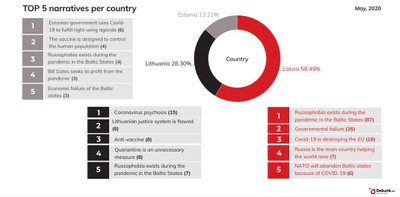
“In May, the main narrative of disinformation was a pandemic-induced wave of Russophobia in the Baltic states. The message appeared on a variety of related topics: from the statement that quarantine became a pretext to ban the May 9th events to the debate that European countries were rewriting the history of World War II and the Soviet Union to hide their economic and political incapacity. The narrative of Russophobia was especially popular in Latvia and counted for more than half of the disinformation recorded there. It was also widely communicated in other countries and appeared among 5 most popular fake news,” A. Kazlauskas comments.
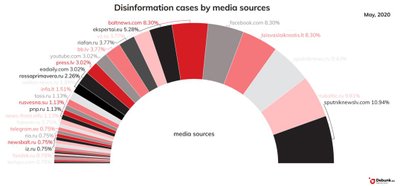
The other most common disinformation messages in the Baltic states differed. In Lithuania, the misleading news stood out with the biggest skepticism towards the measures applied by the government, at the same time trying to diminish the image of the judicial system. In Latvia, false publications also referred to government failures and the destruction of the European Union while facing COVID-19. Meanwhile in Estonia, disinformation stood out with anti-vaccine narrative and the claims that Estonian government uses COVID-19 to fulfill right-wing agenda.
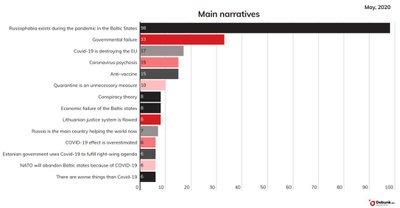
Debunk EU analysts calculate that the investigated articles alone reached more than 49.2 million contacts through web pages, and yet 42.4 thousand contacts through social media. “The spread of misleading messages, especially in Russian-speaking audiences, is very high. For example, one article on the rubaltic.ru website entitled “They have called “occupants” the wrong ones: celebration of VictoryDay in Latvia” got 3706 reactions, 536 shares and 353 comments on social media. 60% of all articles were published in Russian language, one fifth of the disinformation was published in Lithuanian, about 11% – in Latvian and 6% – in Estonian,” A. Kazlauskas calculates.
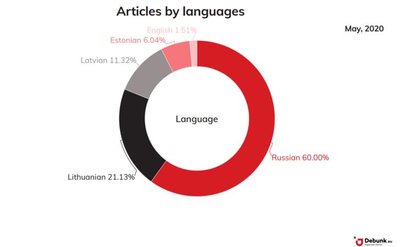
In May, the sources with the highest amount of disinformation were sputniknewslv.com, rubaltic.ru, sputniknews.ru, laisvaslaikrastis.lt, baltnews.com and various Facebook groups. Analyst at Debunk EU notes that the number of fake news related to COVID-19 decreased slightly towards the end of May. According to him, this process is closely related to the local media’s attention to the pandemic. The expert predicted that a possible event of a new sudden outbreak of coronavirus in the Baltic states would cause a wave of public concern, consequently the amount of disinformation would also undoubtedly increase.
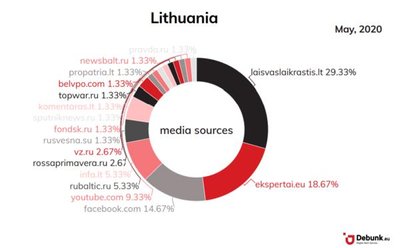
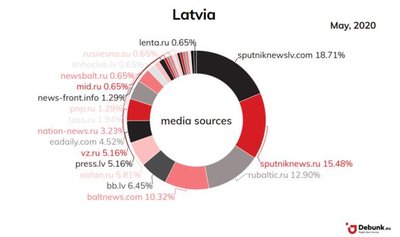
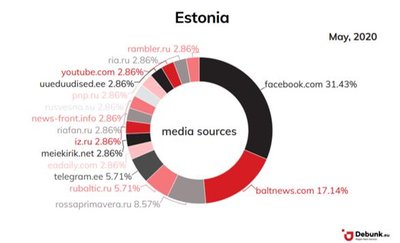
Debunk EU
In 2017, a team of highly qualified disinformation experts and IT development professionals united under Debunk EU project to start collaboratively countering the ever-increasing issue of disinformation in Lithuania. After acquiring funding from Google DNI and DELFI, the largest online news organisation in the Baltics, the team has developed a highly advanced tool based on artificial intelligence, which can analyze more than 30,000 articles a day, by spotting the fake news in 2 minutes after the publication.
Debunk EU was noticed by such media giants as “The Financial Times” and “Deutsche Welle”. The tool has been presented in 17 countries, including the United States, Germany, the United Kingdom, France, Serbia, etc.
